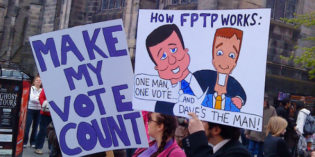
Reforming the Gender Recognition Act
In 2017, the British government announced it would consult on amending the Gender Recognition Act 2004 to introduce the principle of self-determination for transgender people. With this process currently stalled amid increasingly acrimonious debates, Peter Dunne sets out the proposed legal reforms and points of contention.

Book Review | Post-Truth: How We Have Reached Peak Bullshit and What We Can Do About It by Evan Davis
In Post-Truth: Why We Have Reached Peak Bullshit and What We Can Do About It, Evan Davis analyses the rise of a post-truth environment, its historical antecedents and the cultural factors that enable it to flourish in the contemporary moment. Ignas Kalpokas praises this book for combining journalistic flare, accessibility and substance to offer a multi-faceted understanding of how post-truth functions in society today.

Partisanship and the gender gap: support for gender quotas in Australia
The disparity in the gender gap in parliament between the Australian Labor Party and Liberal Party has grown over time. Katrine Beauregard assesses what measures to increase the representation of women in parliament the public – and political partisans – would support.

Local elections: diverse voices are being drowned out by the undemocratic voting system in England and Wales
England’s local councillors are elected under a First Past the Post electoral system with multi-member wards. As a result, Chris Terry argues, the results will be strongly non-proportional and so the system needs to be reformed.

England’s local elections 2018: why the results will matter for both government and opposition parties
On Thursday, 3 May, there are local elections in many towns and cities across England, including London. Tony Travers assesses what is at stake for the main parties, and what the key benchmarks for success will be in terms of local results and national equivalent vote share.

England’s local elections 2018: previewing Liverpool and Wirral
With local elections coming up across England on Thursday, 3 May, Tom Laing previews the competitive seats on both sides of the River Mersey in Liverpool and Wirral. Like many of the metropolitan areas with elections this week, they offer few opportunities for Labour to advance beyond their already dominant position.

Book Review | ‘Tomorrow Belongs to Us’: The British Far Right since 1967 edited by Nigel Copsey and Matthew Worley
‘Tomorrow Belong to Us’: The British Far Right since 1967, edited by Nigel Copsey and Matthew Worley, offers an interdisciplinary collection that explores the development of the British far right since the formation of the National Front in 1967, covering topics including Holocaust denial, gender, activist mobilisation and ideology. Katherine Williams recommends this insightful and dynamic volume, which shows the importance of new approaches and methodologies when it comes to examining the rise of the far right in Britain.

England’s local elections: how councillor numbers are being reduced by stealth
Local elections are being held across England on 3 May, but finding out where and for which seats is not always straightforward. Of more concern, writes Chris Game, is that the number of local councillors is gradually being reduced, in a process that lacks transparency, proper scrutiny and a clear, democratic rationale.

Does it really matter if we call Australian politics ‘semi-parliamentary’?
Australia’s ‘hybrid’ executive-legislative relationship, whereby the two chambers of parliament have distinct and separate powers, has been described in numerous ways, including ‘semi-parliamentarism’. In this, the final of three pieces on the subject, Marija Taflaga argues that the terminology matters, and the term helps both politicians and political scientists clarify how the Australian system works, and understand the political incentives and behaviours it produces.





 Democratic Audit's core funding is provided by the Joseph Rowntree Charitable Trust. Additional funding is provided by the London School of Economics.
Democratic Audit's core funding is provided by the Joseph Rowntree Charitable Trust. Additional funding is provided by the London School of Economics.